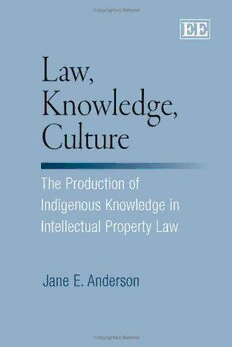
Law, Knowledge, Culture: The Production of Indigenous Knowledge in Intellectual Property Law PDF
268 Pages·2009·1.983 MB·English
Most books are stored in the elastic cloud where traffic is expensive. For this reason, we have a limit on daily download.
Preview Law, Knowledge, Culture: The Production of Indigenous Knowledge in Intellectual Property Law
Description:
Over a period of roughly twenty years, the challenge of how to prevent the unauthorized use of indigenous knowledge has become a problem perceived to be best solved by and managed through an intellectual property regime. This book offers a socio-legal study of the emergence of indigenous interests in intellectual property law. It examines the way indigenous knowledge has become a category of intellectual property law and consequently how legal processes have been involved in governing very specific conceptions of indigenous knowledge. The book goes on to explore the range of competing political interests that have influenced how law has dealt with the issue, how governments understand the problem and how Indigenous expectations for legal remedy have been constructed.
See more
The list of books you might like
Most books are stored in the elastic cloud where traffic is expensive. For this reason, we have a limit on daily download.
